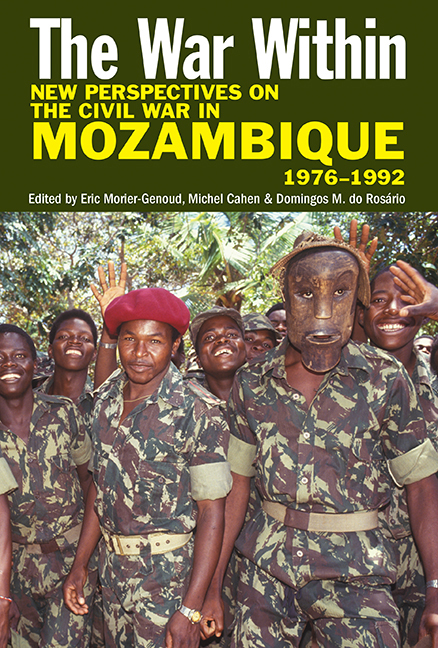Book contents
- Frontmatter
- Contents
- List of Illustrations
- Contributors
- List of Abbreviations
- Introduction The Civil War in Mozambique: A history still to be written
- Part I In the Northern Heart of the Civil War
- 1 The Anti-Frelimo Movements & the War in Zambezia
- 2 War to Enforce a Political Project?: Renamo in Nampula Province, 1983−1992
- 3 Spiritual Power & the Dynamics of War in the Provinces of Nampula & Zambezia
- 4 The War as Seen by Renamo: Guerrilla politics & the ‘move to the North’ at the time of the Nkomati Accord, 1983−1985
- Part II In the South Another Kind of War?
- Part III Inside Out: New Perspectives & The World-System
- Conclusion New Perspectives on the Civil War in Mozambique
- Towards a Bibliography of the Mozambican Civil War
- Index
3 - Spiritual Power & the Dynamics of War in the Provinces of Nampula & Zambezia
from Part I - In the Northern Heart of the Civil War
Published online by Cambridge University Press: 27 July 2018
- Frontmatter
- Contents
- List of Illustrations
- Contributors
- List of Abbreviations
- Introduction The Civil War in Mozambique: A history still to be written
- Part I In the Northern Heart of the Civil War
- 1 The Anti-Frelimo Movements & the War in Zambezia
- 2 War to Enforce a Political Project?: Renamo in Nampula Province, 1983−1992
- 3 Spiritual Power & the Dynamics of War in the Provinces of Nampula & Zambezia
- 4 The War as Seen by Renamo: Guerrilla politics & the ‘move to the North’ at the time of the Nkomati Accord, 1983−1985
- Part II In the South Another Kind of War?
- Part III Inside Out: New Perspectives & The World-System
- Conclusion New Perspectives on the Civil War in Mozambique
- Towards a Bibliography of the Mozambican Civil War
- Index
Summary
Everyone wanted to be like Manuel [António], but he was the [only] one who knew about the genuine medicine.
Naparama commander, Nicoadala 8 March 2012The war in Mozambique from the late 1970s until 1992 placed a heavy burden on the Mozambican population, resulting in an estimated one million deaths and almost five million displaced. Though much research on the war has focused on the origins and behaviour of the rebel group Renamo (see the Introduction to this volume), others, including civilians, also played an active role. The suffering caused by the war brought about several popular armed and unarmed self-defence movements to stop the violence. One such armed movement was the Naparama, a peasant militia created by a traditional healer, Manuel António, in 1988, based on the belief in a vaccine to make people invulnerable to bullets. Within a year, the movement grew from a couple of hundred to several thousand members and spread across the country's central and northern provinces. The people embraced this new force and, after being co-opted by the government, it played a strong part in fighting back the rebel group, Renamo. By 1991, the Naparama was present in two thirds of the northern territory and its success led to an until-then unknown stability during wartime, at least for a certain amount of time.
The formation and diffusion of the Naparama goes against the common depiction of the war as a ‘dichotomous’ conflict between Frelimo, the party in power, and Renamo. It draws attention to a phenomenon common to many civil wars in which the population is actively involved in various local arrangements to curb violence and provide security. These security arrangements include militias, self-defence forces and paramilitaries, who all become significant actors as instruments for counterinsurgent operations and/or protectors of specific communities, thereby challenging neat distinctions between insurgents and the state. While many of these armed groups emerge as grassroots projects, they are often co-opted by the state as part of its counterinsurgency strategy. This also occurred in the case of the Naparama, as Frelimo soon realized the potential of the Naparama's power against Renamo and tolerated and at times even actively supported the Naparama's activities.
- Type
- Chapter
- Information
- The War WithinNew Perspectives on the Civil War in Mozambique 1976–1992, pp. 75 - 99Publisher: Boydell & BrewerPrint publication year: 2018
- 2
- Cited by



